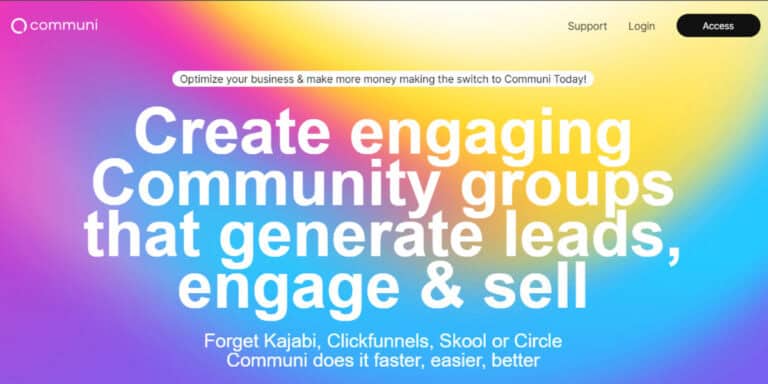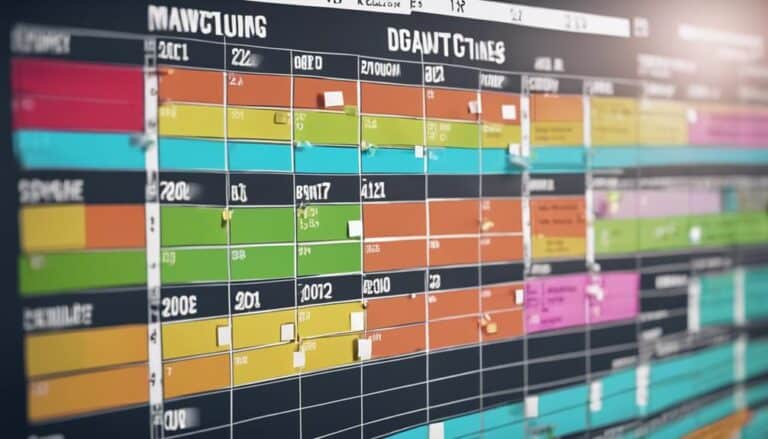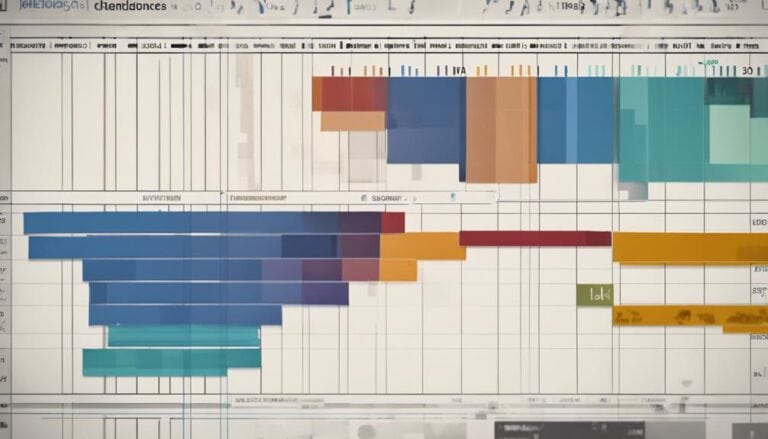When it comes to efficient project planning for compact teams, striking a balance between thoroughness and agility is key. By honing in on essential strategies that maximize productivity without sacrificing quality, you can significantly streamline your team's workflow and outcomes.
From optimizing task management to fostering open communication channels, the success of your project lies in the details. Explore how simple yet impactful adjustments can revolutionize the way your compact team operates and achieves its goals.
Key Takeaways
- Streamline communication channels by eliminating unnecessary meetings.
- Align agenda topics with project goals to maintain focus and efficiency.
- Define actionable tasks and track progress for accountability and productivity.
- Utilize efficient tools and foster team development strategies for optimal project planning.
Eliminate Unnecessary Meetings
To boost productivity and efficiency within your compact team, the key first step is to cut down on unnecessary meetings. Project success hinges on effective communication among team members. Unproductive meetings not only waste time but also hinder progress. Research indicates that 67% of meetings fail due to a lack of clear objectives, leading to confusion among team members. By eliminating unnecessary meetings, you can streamline communication channels and ensure that every interaction serves a purpose in advancing the project.
To keep your team members focused and engaged, it's crucial to prioritize effective communication over excessive meetings. Companies lose billions annually on unproductive meetings, with employees spending up to 31 hours per month in such gatherings. This time could be better utilized for project-related tasks. By reducing the number of meetings and implementing clear agendas when necessary, you can significantly enhance your team's productivity and overall project success.
Make Meetings More Productive
To enhance the effectiveness of your team meetings, start by setting clear objectives and creating structured agendas that guide discussions toward actionable outcomes.
Ensure that action items are clearly assigned and follow-ups are scheduled to maintain momentum and accountability.
Utilize tools like virtual boards or project management software to facilitate collaboration and streamline the meeting process for optimal productivity.
Agenda Setting
Improve your team's meeting productivity significantly by implementing a well-defined agenda setting strategy. Setting a clear agenda is crucial for effective project planning.
Here are three key tips to enhance your agenda setting approach:
- Align with Project Goals: Ensure that the topics on the agenda directly relate to the project goals and objectives. This alignment keeps discussions focused and drives progress towards the project's successful completion.
- Define Project Scope: Clearly outline the project scope within the agenda to provide context for discussions. This helps team members understand the boundaries of their work and prevents scope creep during meetings.
- Create an Effective Agenda Structure: Organize the agenda with defined topics and time allocations. This structured approach prevents off-topic discussions, maintains meeting efficiency, and ensures that all essential points are addressed.
Action Items
Enhance your team's meeting productivity by clearly defining actionable items that drive progress and accountability towards project goals. When assigning tasks, ensure they align with project requirements to keep the team focused. Use the table below to document assigned tasks, responsible team members, deadlines, and progress updates. By detailing these action items, you create a roadmap for your team to follow, increasing efficiency and ensuring project success. Regularly review and update this list during meetings to track progress and address any roadblocks promptly.
| Task Description | Assigned To | Deadline | Progress |
|---|---|---|---|
| Research competitors | John Doe | 10/15/2022 | In Progress |
| Develop marketing plan | Jane Smith | 10/20/2022 | Not Started |
| Test new software | Alex Johnson | 10/25/2022 | Pending |
| Finalize budget | Sarah Lee | 10/30/2022 | Not Started |
Provide Necessary Tools
Equipping your compact team with the right tools is essential for optimizing performance and efficiency in project planning. By providing the necessary resources, you can ensure that your team members have what they need to work effectively and efficiently. Here are three key considerations for providing the necessary tools:
- Efficient Tools: Enhance team performance by streamlining tasks and improving productivity. Investing in tools that automate repetitive tasks can save time and allow your team to focus on more critical project activities.
- Collaboration Tools: Compact teams rely heavily on communication and coordination. Utilize collaboration tools that facilitate seamless interaction among team members, regardless of their physical locations.
- Project Management Software: Implementing project management software is crucial for task organization, progress tracking, and overall project efficiency. Such tools help in managing timelines, assigning tasks, and monitoring project milestones effectively. Utilizing these resources will enable your compact team to work cohesively and achieve project goals efficiently.
Set Communications Expectations
When setting communications expectations for your compact team, be sure to clearly outline preferred channels for communication.
Define response times to manage expectations effectively and ensure timely responses.
Establish guidelines for communication etiquette to maintain professionalism and clarity in all team interactions.
Clear Communication Channels
To ensure effective project communication within compact teams, setting clear communication channels and expectations is essential. When establishing these channels, consider the following:
- Preferred Methods: Choose communication tools that work best for your team, such as emails, instant messaging, or project management platforms, to streamline information exchange efficiently.
- Defined Channels: Clearly outline where and how information should flow within the team to avoid confusion and ensure messages reach the right recipients promptly.
- Encouraged Transparency: Foster an environment where open and transparent communication is encouraged, promoting collaboration and problem-solving among team members effectively.
Define Response Times
Establishing clear response times is crucial for effective communication and productivity within compact teams. By defining specific time frames for responses to messages or task assignments, you create a structured approach to managing tasks and facilitating smoother communication flow.
This clarity helps team members organize their work efficiently, ensuring that project timelines are met without unnecessary delays. Moreover, setting expectations around response times cultivates a sense of responsibility and promptness among team members, enhancing overall task management.
Consistent communication on expected response times fosters a culture of accountability and professionalism, where everyone understands the importance of timely interactions. Emphasizing these communication guidelines will lead to improved task coordination and streamlined project progress in your compact team.
Establish Preferred Tools
Transitioning smoothly from defining response times, you can now optimize your team's communication efficiency by establishing preferred tools that will serve as the backbone of your project coordination.
Key Points:
- Tool Suitability: Choose tools that cater to the specific needs of small teams to ensure effective communication.
- Consistency: By setting preferred tools, you create a unified communication platform, reducing confusion and enhancing productivity.
- Training and Familiarity: Provide training on selected tools to team members to ensure everyone is comfortable and proficient in using them.
Create Culture of Feedback
Fostering a culture of feedback within your compact team cultivates continuous improvement and enhances overall performance. Small, effective teams need regular feedback to address issues promptly and promote growth. Constructive feedback plays a vital role in helping team members understand their strengths and areas for development. By encouraging open feedback channels, you promote transparency and trust among team members, creating a supportive environment for constructive criticism.
To emphasize the importance of feedback within your team, consider implementing the following table:
| Benefits of Feedback in Small Teams |
|---|
| Fosters continuous improvement |
| Enhances team performance |
| Promotes transparency and trust |
| Identifies strengths and areas for growth |
| Shows commitment to team development and success |
Acknowledging and implementing feedback not only demonstrates a dedication to improvement but also shows your team that their input is valued. By creating a culture where feedback is welcomed and acted upon, you pave the way for enhanced collaboration and success.
Offer Incentives
To encourage peak performance and motivation within your compact team, consider implementing a range of incentives tailored to recognize and reward excellence. Incentives play a crucial role in keeping team members engaged and committed to achieving project goals.
Key Points to Consider:
- Diverse Incentives: Offer a variety of incentives such as cash rewards, trips, event tickets, or even extra time off to motivate team members. Different individuals may be driven by different types of rewards, so having a range of options can cater to various preferences.
- Skill Development Opportunities: Provide training programs that focus on skill development. This not only enhances the capabilities of team members but also shows that you're invested in their growth and success.
- Challenges for Growth: Challenge your team with tasks that encourage personal and professional growth. By setting challenging yet achievable goals, you can boost motivation and foster a culture of continuous improvement.
Give Ownership and Autonomy
Encouraging team members to take ownership and autonomy in their tasks is a pivotal step towards fostering accountability and commitment within a compact team. Providing individuals with ownership over specific responsibilities instills a sense of pride and accountability, leading to increased dedication to the project's success. Autonomy plays a crucial role in empowering team members to make decisions and showcase their skills and creativity in problem-solving. By granting autonomy, you create a work environment built on trust and responsibility, ultimately boosting engagement levels and fostering a culture of collaboration.
Ownership and autonomy aren't just about delegating tasks; they also stimulate innovation and individual growth within the team. When team members feel empowered to take the reins on their projects, it contributes significantly to overall team efficiency and effectiveness. Additionally, offering autonomy can enhance job satisfaction and retention rates, as individuals feel valued and trusted in their roles. Embracing ownership and autonomy is a strategic approach to maximizing team potential and achieving project goals efficiently.
Final Thoughts
How can you ensure that your compact team excels in project planning and execution? As a Project Manager leading a small team, it's crucial to reflect on key strategies to enhance your project's success. Here are three essential final thoughts to consider:
- Utilize the Agile Framework: Implementing methodologies like Agile, Scrum, or Kanban can significantly boost your team's efficiency. These frameworks promote iterative development, adaptive planning, and continuous improvement, aligning perfectly with the dynamic nature of compact teams.
- Ensure You Have the Right People: Building a successful team starts with having the right individuals on board. Look for team members who not only possess the necessary skills but also demonstrate good communication, adaptability, and a collaborative spirit. The synergy among team members plays a vital role in project outcomes.
- Focus on Continuous Learning: Encourage a culture of learning from past projects. Emphasize the importance of effective risk management, setting achievable goals, and refining task assignments based on feedback. Continuous improvement is key to long-term success in project planning for compact teams.
Frequently Asked Questions
How Do You Lead a Project Team Effectively and Efficiently?
To lead a project team effectively and efficiently, you must prioritize team dynamics and communication strategies. Delegate tasks thoughtfully, manage time effectively, resolve conflicts promptly, and use motivation techniques to keep the team engaged and productive throughout the project.
How Do You Plan a Small Project?
To plan a small project effectively, you must delegate tasks, communicate with your team, manage timelines and allocate resources efficiently. Assess risks and have problem-solving strategies in place. Stay organized and adaptable to ensure success.
What Are the Three Most Important Things in Project Management?
In project management, the three most crucial elements are time management and resource allocation, risk assessment and communication strategy, and stakeholder engagement with progress tracking. They form the foundation for successful project execution and completion.
What Are Examples of Small Projects?
When managing small projects, consider examples like agile development for quick results, time management for efficiency, team collaboration for synergy, resource allocation for effectiveness, scope definition for clarity, and budget tracking for accountability.
Conclusion
In wrapping up, remember to streamline your team's collaboration efforts for optimal efficiency.
By embracing a culture of constructive feedback and offering incentives for success, you can foster a productive work environment.
Providing the necessary tools and autonomy to team members will empower them to take ownership of their tasks.
Keep these tips in mind to navigate project planning with finesse and achieve your goals effectively.





